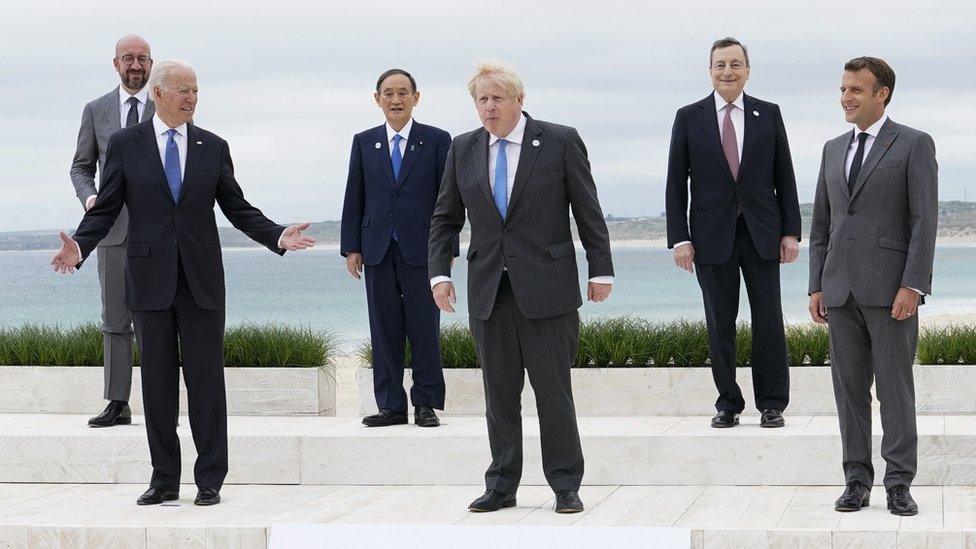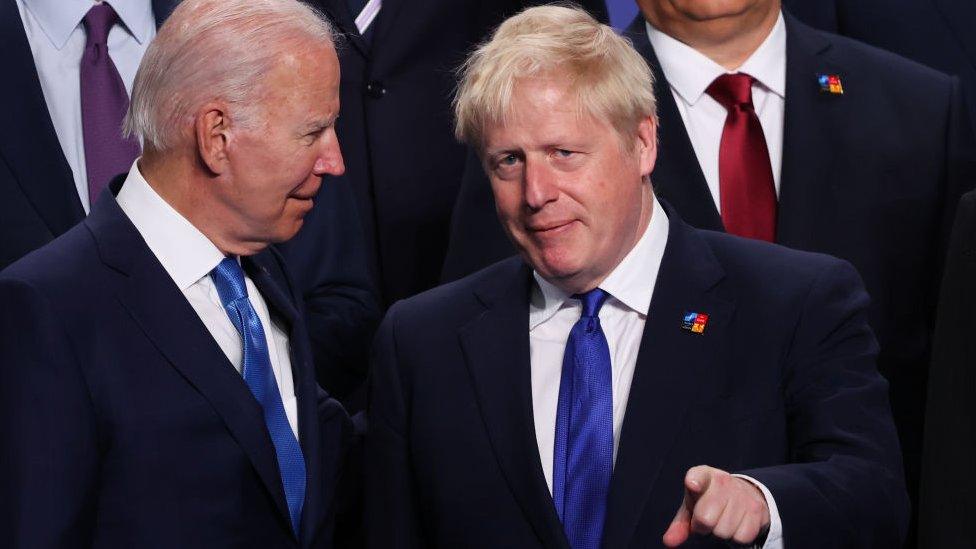Boris Johnson: What does the world make of UK PM's exit?
- Published

Boris Johnson hosts G7 world leaders for a summit in Cornwall last year
Boris Johnson's almost three years in Downing Street have included their fair share of turbulent world events: Russia's invasion of Ukraine, the Covid pandemic and, of course, Brexit to name three.
So how is his resignation being seen around the world? Our correspondents give us the views from their regions:

Is the EU rubbing its hands with glee at Boris Johnson's downfall? Yes - but also no.
Over the last 24 hours, I've been getting texts and calls from EU diplomats, filled with multiple question and exclamation marks. European media headlines drip disdain and incredulity at what they view as a political opera buffa (slapstick opera performance) currently unfolding in the UK.
But the EU view has often been one of impatient disappointment that Mr Johnson lasted so long as prime minister.
A number of European countries - particularly those in central and eastern Europe - are exceedingly grateful to Boris Johnson for his hardline stance on Russia, even before Vladimir Putin's invasion of Ukraine. But they believe that to be a UK position that will hold even after he is no longer prime minister.
Watch: Boris Johnson: A career in moments
Few in mainland Europe will shed a tear when Mr Johnson goes. Politicians blame him for blustering his way through Brexit. They accuse him of failing to be honest with the British people about its true implications.
Wholesale rejection of Mr Johnson's bill currently making its way through parliament, to unilaterally rewrite the international post-Brexit treaty on Northern Ireland, has managed to unite the normally bickering EU institutions: the Commission, Parliament and Council.
That said, no one I've spoken to in Brussels sounds particularly hopeful as to who may eventually take over from Mr Johnson as UK prime minister. Most here say they view the plethora of resignations of Conservative ministers as self-interested career-saving attempts, rather than evidence they disagree with Mr Johnson's policies.
Not even opposition Labour leader Keir Starmer talks about reversing Brexit, or noticeably softening it.
The main EU hope expressed today is the same I heard immediately after the 2016 Brexit vote: EU politicians wish for a UK leader, they say, who has the political confidence to talk and negotiate with Brussels, rather than constantly playing to, and being distracted by, the political gallery at home.

Joe Biden and the Democrats in control of the US government are unlikely to be too distraught over Boris Johnson's fall from grace. Some, in fact, may celebrate the news that has made headlines across the US.
In a statement released on Thursday to BBC US media partner CBS News, Mr Biden simply notes that the "special relationship" between the US and the UK "remains strong and enduring", never mentioning Mr Johnson by name. The embattled Brit didn't even get a "we wish him best of luck in his future endeavours".
The American president has never appeared a fan of his British counterpart, disagreeing with him on the wisdom of Brexit and expressing particular concern for the difficult situation it has created for his ancestral homeland of Ireland.
It is true that Mr Biden has relied on Mr Johnson as a steadfast ally in his attempts to rally a united European response to Russian aggression in Ukraine.
And the two have worked together to counter rising Chinese influence in the Pacific.

Boris Johnson and Joe Biden at last month's Nato summit in Madrid
But to many Democrats, Mr Johnson and Donald Trump are political peas in a pod, with similar views on trade and immigration and similarly iconoclastic political instincts.
By their logic, anything that is bad for Mr Johnson bodes ill for Mr Trump and his Republican allies. And anything that hurts Mr Trump is good for the Democrats.
Mr Biden may want to take pause, however, as Mr Johnson's undoing could have less in common with Mr Trump's political disposition than with his own.
Setting aside the litany of scandals that were the proximate cause of Mr Johnson's downfall, the British prime minister had seen his political standing eroded by issues bedevilling most Western democracies - economic uncertainty, surging inflation and social discord.
No one - in the UK, US or elsewhere - has figured out an easy solution to these problems. And they all may eventually reap the whirlwind that public discontent with the status quo has sown.
So while the American Left may welcome what it sees as Mr Johnson's final reckoning, his departure could be a harbinger of doom for those currently in power in the US, not for the Republicans on the sidelines or the man contemplating a political revival in Mar-a-Lago.

For those keenly following British politics on the continent, a common thread is emerging from early reaction to news of Boris Johnson's resignation as party leader and prime minister in a few months' time: one of envy.
Those who've taken to social media have lamented how uncommon it is in many African countries for a leader to step down from power or even for his party to force him to leave over a lack of performance.
They've used his resignation to comment on the seeming lack of accountability of politicians in their own countries to the people they govern.
It's important to add, however, that Mr Johnson has not been seen as a close friend of Africa during his term in office. It is perhaps to be expected that news of his leaving has been met with limited reaction.

This is big news in places such as Australia, India, Malaysia and here in Singapore as well, of course - countries that have had historical links to the UK and inherited their parliamentary system as part of being previous colonies.
And more than one commentator has asked the question: what kind of signal is the UK sending about the state of democracy to the rest of the world, when even after a number of his colleagues have asked for him to step down - ostensibly for the good of the country - the leader initially refused to go?
Is this - many are wondering - the slow demise of the democratic system?
There's also concern about how this might affect geopolitics, given the war in Ukraine, and whether this is a distraction in the West that again could take away from more pressing issues that Asian governments are concerned about - like the cost of living, inflation and the rising influence of China in the region.

Boris Johnson resignation
THE NEXT PM: Sunak, Truss and other potential candidates
WHAT NOW? How a new leader is elected
LOST SUPPORT: Five things that led to PM's downfall
JOHNSON: The PM who broke all the rules
VIDEO: Johnson's career in moments
Related topics
- Published7 July 2022
